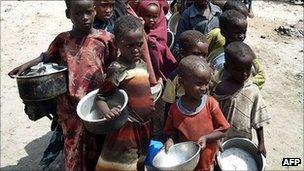Somali famine: Red Cross aid push in Islamist areas
- Published

Tens of thousands of Somalis have fled their villages in search of food
The International Red Cross has begun a huge distribution of aid to one million people in famine zones in Somalia controlled by Islamist militants.
A continuous operation will transport the food in lorries from the coast deep into areas controlled by al-Shabab.
The Red Cross says it is its biggest such operation anywhere in the world.
It followed difficult negotiations with al-Shabab, which banned many Western aid agencies from its territory two years ago.
The UN has declared a famine in six regions of Somalia - mostly in al-Shabab areas.
Tens of thousands of people have fled to seek food aid in the capital, Mogadishu, which is ruled by the weak interim government, or in camps in neighbouring Kenya and Ethiopia.
Last month, al-Shabab began moving people out of displacement camps, run by local charities in Islamist areas, and returning them to their villages.
The group said it wanted people to prepare land ahead of the rainy season.
But no crops are expected to be ready for harvest until January and aid workers said a massive food distribution operation would be needed for months to come.
The Red Cross has worked in Somali for 20 years - and it said it used this track record to negotiate access with the Islamists.
Red Cross spokesman Geoff Loane told the BBC its operation was a three-month distribution, targeting vulnerable people like farmers and pastoralists.
The organisation will also provide seed to nearly a quarter of a million farmers, so that they can begin to recover from the region's worse drought in 60 years.
"If all goes well, hopefully these farmers will be able to harvest some crops by the end of the year," Mr Loane said.
BBC Africa analyst Martin Plaut says if the transportation operation is successful it could break the back of the famine.
The UN estimates that in September half of the four million Somalis in need received food aid. With the Red Cross reaching another million or more, it could mean that three-quarters of the victims of the famine and drought will be helped.
To this should be added money sent home by the Somali diaspora and aid from Islamic organisations, our analyst says.
